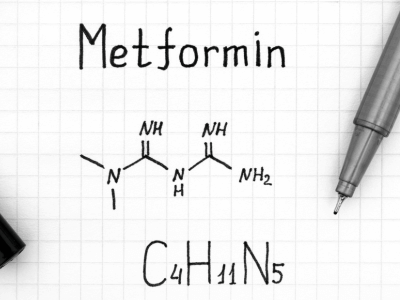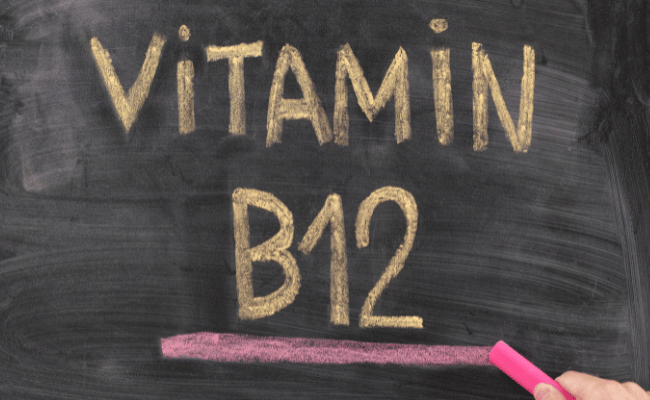Vitamin B12, also known as cobalamin, plays a pivotal role in our body’s essential functions. From nerve function to red blood cell formation, this multifaceted vitamin is a linchpin of our physiological operation. Yet despite its significance, many individuals suffer from vitamin B12 deficiency, often without even realising it. This deficiency can lead to a multitude of health issues, ranging from fatigue and weakness to more severe neurological complications if left untreated. When B12 levels drop, identifying and diagnosing the root cause can often be a complex but important process, requiring careful investigation to ensure we do not take a “sticking-plaster” approach to treatment.
So what can cause vitamin B12 deficiency?

While vitamin B12 is essential for our well-being, maintaining adequate levels can sometimes be a challenge. Vitamin B12 is naturally found in animal products like meat, fish, eggs and dairy. Therefore strict vegans and vegetarians who don’t consume fortified foods or supplements are at an increased risk of deficiency.
However beyond dietary intake, a surprising array of factors can contribute to a B12 deficiency. Here we will delve into the possible causes of Vitamin B12 deficiency and the B12 differential diagnosis, according to the National Institute for Health and Care Excellence (NICE) guidelines, exploring the diverse conditions and lifestyle factors that can lead to a deficiency, ensuring a comprehensive understanding.
Complications of the Stomach

The absorption of vitamin B12 occurs in the small intestine with the help of intrinsic factor, a protein produced by the stomach lining. Any condition affecting the gastrointestinal tract, such as autoimmune gastritis (which can lead to pernicious anaemia), celiac disease, Crohn’s disease, or surgical procedures like gastric bypass surgery, gastrectomy or terminal ileal resection, can impair the absorption of B12, and increases the chance of developing vitamin B12 deficiency.
Autoimmune Diseases
Among autoimmune diseases, multiple sclerosis (MS), Sjögren’s syndrome, type 1 diabetes and thyroid disorders pose a risk for B12 deficiency. In MS, the immune system can attack the cells responsible for B12 absorption, while thyroid disorders can disrupt hormones that influence B12 metabolism.
Medications
Certain medications can interfere with the absorption or utilisation of vitamin B12 in the body. Proton pump inhibitors (PPIs), commonly prescribed for acid reflux and ulcers, as well as metformin, a medication for diabetes, have been associated with decreased B12 absorption over prolonged use.

Other medications that can affect B12 absorption include colchicine, phenobarbital, pregabalin, primidone, topiramate and H2-receptor antagonists. Nitrous oxide is also known to inactivate vitamin B12 in the body. Therefore those who use recreational nitrous oxide are at risk of B12 deficiency.
Macrocytosis
Macrocytosis, a condition distinguished by larger-than-normal red blood cells, often signifies a B12 deficiency. It can result from a variety of conditions and factors, including alcohol misuse, liver disease, and certain medications. Pregnancy, too, can introduce temporary macrocytosis due to physiological plasma volume expansion.
Lifestyle Choices

Chronic alcohol consumption and the misuse of drugs can trigger a decline in vitamin B12 levels by altering gut absorption. Both tend to damage the stomach lining, disrupting the body’s ability to absorb B12 efficiently. Similarly, certain lifestyle choices, like smoking, can also pave the way to a B12 deficiency. Cigarette smoke contains cyanide, which the body converts into a substance that can interfere with vitamin B12 utilisation.
Lead Toxicity
Lead toxicity is another culprit behind B12 deficiency. Lead interferes with the body’s ability to make haem, a component of the haemoglobin molecule, leading to anaemia, where B12 often plays a starring role.
Infectious Diseases
The role of infectious diseases, such as HIV and syphilis, in B12 deficiency also warrants attention. These conditions can impair absorption in the gastrointestinal tract or increase the turnover of the vitamin, leading to a deficiency.
Liver Disease
Liver disease offers another route to a B12 deficiency. A healthy liver stores significant amounts of vitamin B12, but when liver health is compromised, these stores can deplete, leading to a deficiency. Similarly, changes in plasma protein levels, often linked to liver and kidney disease, can impact the body’s ability to store and transport vitamin B12.

Pregnancy
Pregnancy can also impact B12 levels due to increased demands on the mother’s body. However, it’s crucial to discern this from a genuine B12 deficiency to avoid unnecessary treatment.
Age
Gastric acid production naturally declines with age, increasing the risk of B12 malabsorption. Elderly individuals, therefore, can be more susceptible to developing B12 deficiency.
Addressing the root cause

Treatment for B12 deficiency hinges on identifying the underlying cause. Adequate dietary intake, supplementation either through oral or intramuscular injections, and addressing underlying health conditions are crucial steps in maintaining optimal B12 levels. Early diagnosis and a comprehensive treatment plan are essential to prevent complications and ensure optimal B12 levels for overall health.
In conclusion,
In conclusion, Vitamin B12 deficiency is a complex condition with a vast array of potential causes. From lifestyle factors to chronic diseases, numerous pathways can lead to this deficiency, underlining the importance of a thorough diagnosis. Through this educational journey into the intricacies of B12 diagnosis, an understanding of the vital role and diverse influences on this essential vitamin is unveiled. By understanding the various root causes of vitamin B12 deficiency, we can better effectively diagnose and manage this condition. Awareness of symptoms and proactive screening in high-risk groups, coupled with a thorough investigation of potential causes, paves the way for early intervention and improved patient outcomes.
Please note: New NICE Guidelines were published in March 2024 for Vitamin B12 deficiency in over 16s: diagnosis and management. The guidelines cover the recognition, diagnosis and management of Vitamin B12 deficiency in people 16 years and over, including recommendations on when to offer initial diagnostic testing and recommendations for treatment depending on the cause of the B12 deficiency.
Interested to learn more about B12 deficiency?

Come join us on Thursday 21st March 2024 between 12:30-1:30pm where we are holding a FREE lunchtime learning session on all things Vitamin B12.
The session aims to cover:
- Understanding Vitamin B12 deficiency
- Exploring its causes and preventative measures
- Identifying signs and symptoms
- Investigations and diagnosis
- Treatment and management
- Current guidance on Vitamin B12 injections

Vitamin B12 – Deficiency
This Comprehensive Vitamin B12 deficiency training course provides health professionals with specific information related to Vitamin B12 deficiency and treatments including vitamin B12 injections. Read full description.




